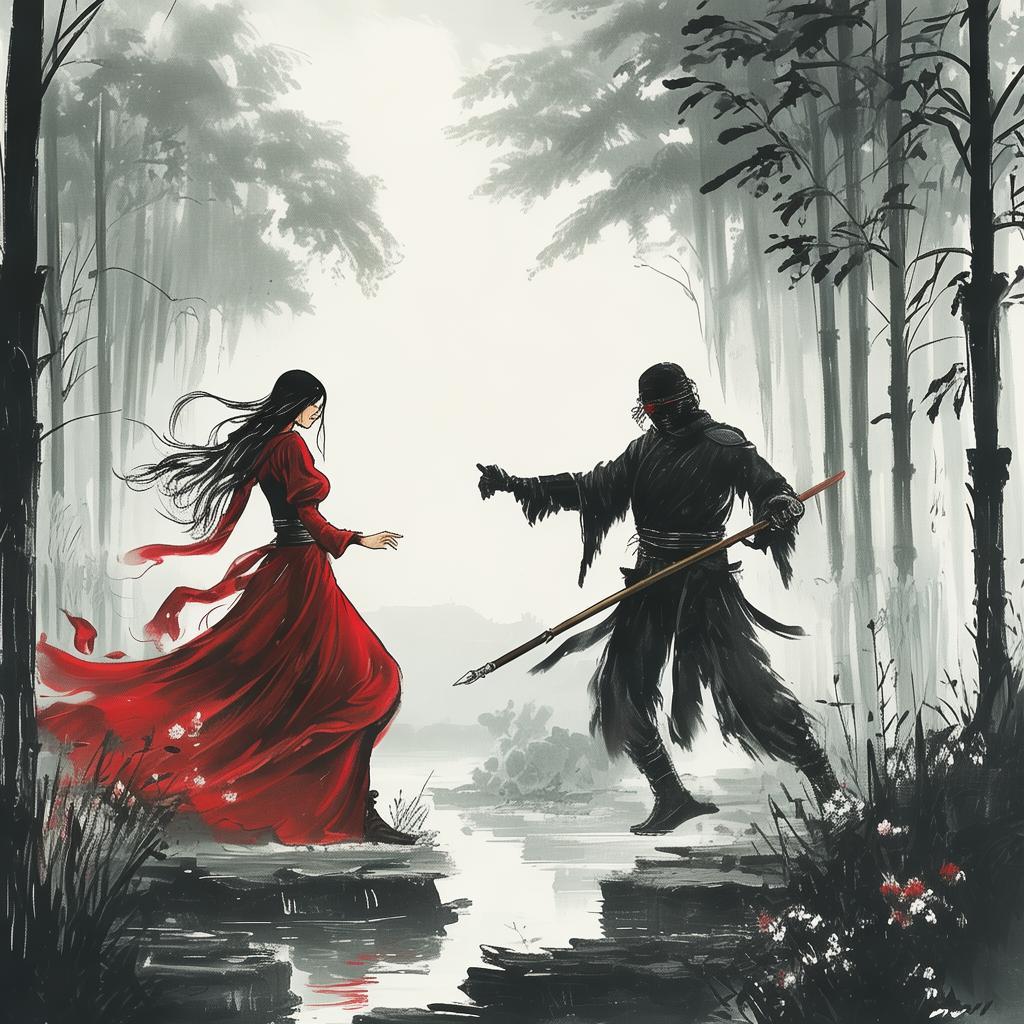The Silent Vow of the Iron Monk
In the remote mountains of ancient China, nestled between peaks veiled in mist, there stood a temple known as the Silent Monastery. It was a sanctuary for those who sought to transcend the material world and embrace the path of martial enlightenment. Among its many inhabitants was a monk named Ching-ho, whose dedication to the martial arts was unparalleled.
Ching-ho's story began in the bustling city of Chang'an, where he was born into a family of renowned swordsmen. From a young age, he displayed a natural talent for the martial arts, and his father, a master swordsman, took great pride in his son's abilities. However, Ching-ho's life took a dark turn when his father was betrayed by a trusted comrade, who sought to seize the family's wealth and power.
The betrayal left Ching-ho's father in a vegetative state, and the family's fortune was squandered. In a fit of rage, Ching-ho vowed to avenge his father's death and restore the family's honor. He left Chang'an behind, seeking refuge at the Silent Monastery, where he hoped to find the spiritual and martial strength needed to exact his revenge.
At the monastery, Ching-ho spent years in rigorous training, mastering the art of the iron monk, a discipline that fused the discipline of Buddhism with the ferocity of martial arts. His reputation as a warrior monk grew, and he was soon sought out by various factions for his services.
One day, a mysterious figure arrived at the monastery's gates, seeking Ching-ho's aid. This individual, known only as the Shadow Dancer, claimed that his life was in danger from a group of powerful martial artists who had turned against him. Desperate for help, the Shadow Dancer offered Ching-ho a substantial sum of money and the promise of a position of power within the Shadow Dancer's organization.
Ching-ho, who had long been weary of the monastery's seclusion, saw this as an opportunity to gain the influence he needed to uncover the truth behind his father's betrayal and exact his revenge. He accepted the Shadow Dancer's offer, leaving the monastery and entering the dangerous world of espionage and intrigue.
As Ching-ho navigated the treacherous waters of the Shadow Dancer's organization, he discovered that the group was far more sinister than he had imagined. The Shadow Dancer was a puppet master, manipulating powerful martial artists to serve his own dark purposes. Ching-ho's loyalties were tested, as he found himself torn between his vow to avenge his father and the growing desire to uncover the truth.
One fateful night, Ching-ho's path crossed with that of a young woman named Mei, who had been forced into the Shadow Dancer's organization against her will. Mei's kindness and innocence touched Ching-ho's heart, and he found himself torn between his vow and his growing affection for her.

As the truth of his father's betrayal began to unravel, Ching-ho realized that the Shadow Dancer was the very same individual who had betrayed his father. The revelation sent Ching-ho into a spiral of rage and despair. He sought to confront the Shadow Dancer, but the encounter ended in a climactic battle that left both men injured.
In the aftermath of the battle, Ching-ho returned to the Silent Monastery, seeking spiritual guidance. He had reached a crossroads in his life, and the path he chose would determine his future. The abbot of the monastery, seeing the turmoil within Ching-ho, offered him a choice: to continue down the path of violence and revenge, or to embrace the teachings of the martial arts and find peace through enlightenment.
Ching-ho, realizing that his quest for revenge had only brought him pain and suffering, chose the path of enlightenment. He dedicated himself to the martial arts and spiritual practices of the monastery, seeking to transcend the material world and find inner peace.
The story of Ching-ho's transformation became legendary within the Silent Monastery. He was known as the Iron Monk, a warrior who had learned the true power of the martial arts: not through violence, but through self-discipline and spiritual enlightenment. As he walked the path of the martial monk, Ching-ho found that true power lay not in the strength of his arms, but in the strength of his spirit.
✨ Original Statement ✨
All articles published on this website (including but not limited to text, images, videos, and other content) are original or authorized for reposting and are protected by relevant laws. Without the explicit written permission of this website, no individual or organization may copy, modify, repost, or use the content for commercial purposes.
If you need to quote or cooperate, please contact this site for authorization. We reserve the right to pursue legal responsibility for any unauthorized use.
Hereby declared.









